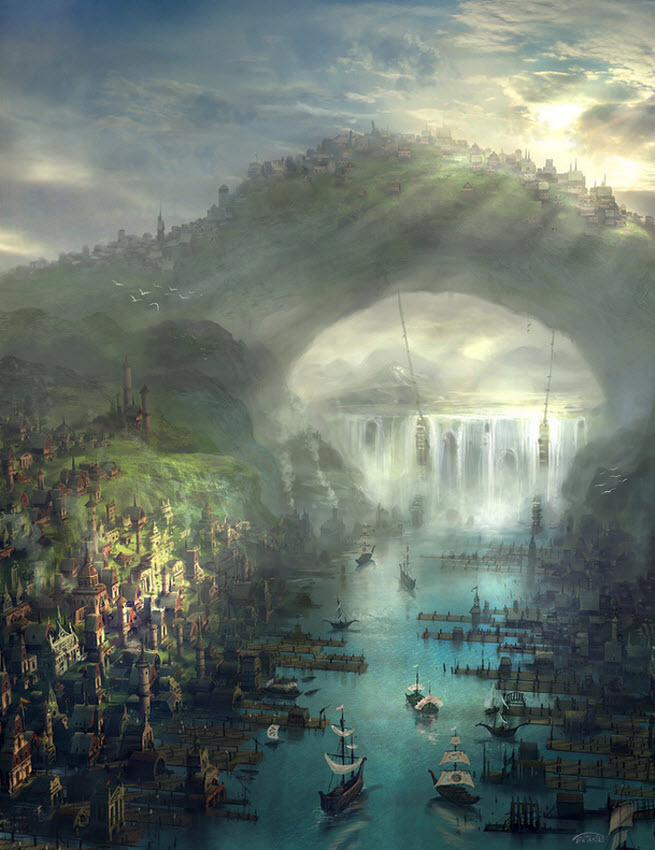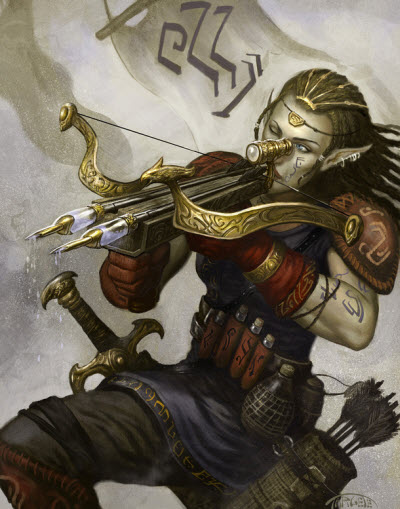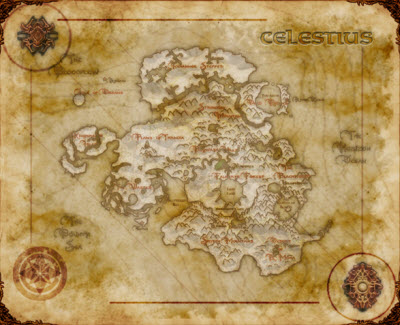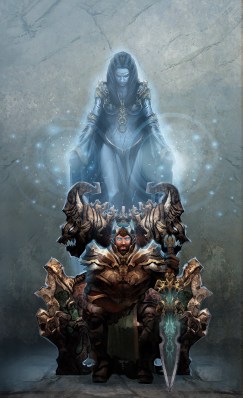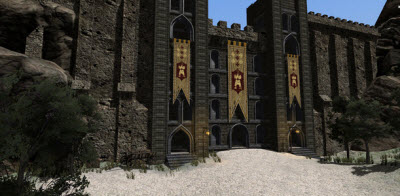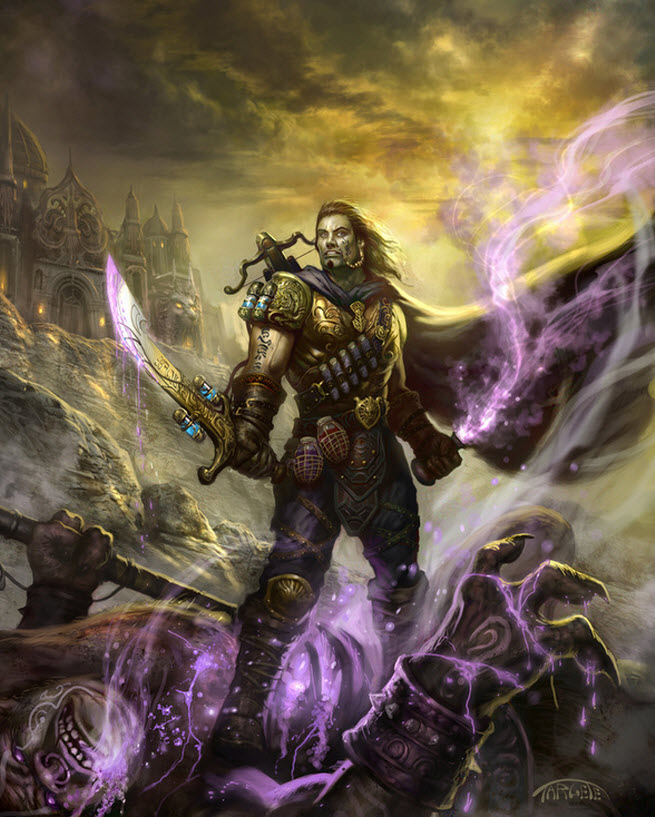Brad McQuaid — the father of EverQuest, one of the most influential massively multiplayer role-playing games ever made — wants you to help build his next-generation online game, Pantheon: Rise of the Fallen.
With the tiny startup Visionary Realms, McQuaid has launched a Kickstarter crowdfunding campaign to raise funding for the hardcore massively multiplayer online game. The San Diego, Calif.-based company is aiming to produce fantasy game world where players can enjoy improved systems for group combat — an area that McQuaid has always found frustrating.
In an interview with GamesBeat, McQuaid (the chief creative officer for the startup) explained his vision for the Unity-based project and why he isn’t just joining the Sony Online Entertainment effort to create EverQuest Next. McQuaid has teamed up with Richard Garriott’s Portalarium (aka Lord British, the creator of Ultima, one of the most important names in role-playing games), offering a deal that gives special rewards to players who donate to both McQuaid’s game and Garriott’s upcoming Shroud of the Avatar RPG.
McQuaid started the company in October with veterans who have worked on MMOs like EverQuest, EverQuest 2, EverQuest Next, Free Realms, Star Wars Galaxies, Vanguard: Saga of Heroes, Defiance, and Rift
The campaign has raised $316,646 from 2,419 backers so far, with 19 days to go. It won’t be easy to raise the $800,000 goal at that rate, but McQuaid is hopeful. Here’s an edited transcript of our interview with McQuaid and designer Salim Grant.
GamesBeat: I imagine you could ask Sony Online Entertainment president John Smedley for a job and a studio to make this kind of game within Sony. Why did you want to do it this way, through a startup and Kickstarter, as opposed to joining a bigger company?
Brad McQuaid: For obvious reasons, we like the idea of a smaller team. We’d love to fund the whole thing via Kickstarter, although I’m not sure if that will happen. If it doesn’t, then we’ll be talking to both investors and some different publishers. But the success that we’re seeing so far, that helps us when we go to a publisher or investor. We can say, “Look, these people are not just interested in our game — they were willing to put money into it.”
We want to keep the company small. At Sigil Games (the previous company McQuaid formed to create Vanguard: Saga of Heroes), I think we maxed out at 105 people. It just wasn’t as enjoyable as when I was on the original EverQuest team, where we had about 23 people. That was a lot more fun, just because we could all talk and share ideas. With 105 people, you have to create all these layers of management. We’re trying to keep this organic. If an artist has a design idea, that’s great. He’s not just supposed to do art. That’s the culture that we want.
GamesBeat: How do you size this project so that you can do it with a small team, given that there’s companies that are taking five years and 200 people to make modern-day MMOs?
McQuaid: Those games, they’re trying to make a mass-market MMO. They’re going to try to appeal to everyone, or as many people as possible. That’s great. We did that with Vanguard, although it got released a little early. We’re making a game now that has a specific target audience, the gamer that’s looking for a more challenging environment and an open world. We’re taking influences from early EverQuest as well as a bunch of modern ideas.
EverQuest, like I said, was made with 23 people in three years for $8 million. That was a long time ago, and things have changed, but in a lot of ways those changes are positive. The engine we’re using, Unity– we’re already playing our game. We can get into combat with NPCs. We’ve got some cool rogue stuff in there already. That would have been impossible 10 years ago. The designers and everyone would be waiting for the engineers to give them some sort of environment that they could start prototyping in. Now, with Unity, we already have that.
Having that target audience will allow us to make the game for a lot less in less time. There are still some games being worked on that are huge in scale, but I think this is the future of MMOs. We’re making one for the people that want challenge back, but there could be all sorts of MMOs that appeal to a specific group of gamers, as opposed to the gamer having to play the big game that tries to be all things to all people and finding out that he doesn’t like this or that part of it. I can see this happening more in the future. Hopefully, we’re blazing a trail for that idea.
GamesBeat: If you have seven people now, what are you expecting for your peak, and how soon might you reach that?
McQuaid: I don’t know of a specific number. Maybe 25 people or so? We have a lot of people we stay in contact with who are planning to leave where they are now and join us once we have funding. We have a lot more people who are interested and have contacted me, or other people on the team, who want to come on board. We have more in touch than we actually need. We can be a little choosy while we continue to build the team.
We’re all working pro bono. We don’t have other jobs. That’s getting us as far as we’re getting, but once we have funding, we’ll be able to more than double the team size.
GamesBeat: As far as what makes it unique, it sounds like the combat system is going to be more modern and accentuate group play.
McQuaid: Yeah, the game is definitely group-focused. We feel that when you do something as a group, it creates a more memorable experience. You’re sharing that experience with others.
Salim Grant: In general, we’re looking at older games, where the focus was less on who can do the most damage per second in an ideal rotation. We’re more focused on watching the combat and reacting to certain things or using utility abilities when you should use them, as opposed to just being part of a rotation.
One of the cool things about the system is that, because of our lore and this world being an amalgamation of a bunch of different planes — the players themselves are fallen heroes who’ve been reborn. Your goal is to collect your artifacts of whatever you were when you were a hero.
McQuaid: In centuries or millennia past, you were defeated. Now, when the player’s actually playing the game, it’s all about growing and empowering and regaining what you had in the past. The history is about the fact that you fell. The game is about the fact that now you’re risen again, about becoming even more than who you were.
Grant: Along the way, you’re going to discover the essences of other fallen heroes that are linked to a world. You can equip those and put abilities in them and mix and match abilities that are limited by your class. Equipping those essences, they have levels associated with them. Some of them will actually let you take on the look of a hero and gain extra power.
It’s a cool concept in that you can swap out different ability sets, but the big thing is that, combat-wise, you are limited in how many abilities that you have available to you. It’s kind of like a deck of cards. This is the hand that’s been dealt to you. You can only use these seven cards. You have to think about the next encounter or group of encounters. I’m going into this dungeon and I know how the mobs work there, so here’s my setup. Then, when I get to a boss , I need to think about this set or the other and maybe load a different set of abilities.
Abilities have a broad range. Some might be standard mana-based abilities, but another might say you could only use it three times in combat, for example. You need to mix them up. You’ll have a standard set of abilities you pick up through a steady progression, but there’s a bunch more you can discover, or templates you can discover. There’s a lot of motivation to go out and explore.
GamesBeat: We have a lot of MMOs out there already and EverQuest Next coming as well. Is there something you’re reacting against here? In what way do you want this to be different from other MMOs?
McQuaid: I’m excited for EverQuest Next, personally. It’s really neat technology. We’re not focused on what might be wrong with other games. But we do feel that there’s a type of game that’s missing. That’s the hole that we’re trying to fill, that challenging, group-oriented game.
GamesBeat: As far as what you plan to deliver, is there a clear modular approach here, where if you get a certain amount of funding, then you can deliver a certain package, but you can add on more elements if you hit a higher funding goal?
McQuaid: Yeah, that’s exactly right. If we meet the stretch goals, what we’re saying is that the game we’ll deliver at launch will have those features. Any stretch goals we don’t meet, they’re still part of our high-level design. We would just have to add them as expansions or downloads, things like that, later on after launch. It’s more of a timing issue. The game is going to have all that stuff at some point. The question is when. That’s a matter of when the money becomes available.
GamesBeat: What’s in the basic feature set that you’re promising?
McQuaid: It’s a solid game about adventure and exploration, going into the depths of a dungeon and defeating boss monsters, building your character, working with other players in a group, feeling good that you play a role within that group, learning our combat system and becoming an expert. It’s that old-school mix of exploration and combat.
If the stretch goals are met, or if we do them as an expansion, we can add other cool things like harvesting, crafting, things like that. But it’ll be a complete game when we launch, no matter what. It’s just a question of how varied the features turn out to be. We would not launch something that felt incomplete, where something glaring is missing. That’s not the plan.
GamesBeat: Do you have a time frame set?
McQuaid: We have a rough time frame. We think we can launch the core game in three years. We’d like a long beta test, so the beta — which would cover different phases — would be about a year. We hope to see people in a beta playing the game and helping us refine and polish it within a couple of years.
GamesBeat: What sort of audience are you looking for? It seems to be a more hardcore style of game.
McQuaid: We don’t really like the term “hardcore” because it can mean so many different things. We try to be more specific. It’s for players who want a challenge. They don’t mind being defeated and learning from that and coming back to eventually prevail.
Our type of player is very social. I use a kind of silly analogy. When I go to the movies, I always want to go with someone else so we can talk about the movie afterward. To me, it’s a social experience. But there’s plenty of people who go to the movies by themselves. It’s the same with Pantheon. Some players have a much better time working together as a team. It’s more like a sport, like soccer, where you have a goalie and defenders and midfield and strikers. If they’re not all in sync and filling their roles, they’re going to get beaned. It’s the same thing here, where everybody has their roles.
We’ve been labeled “old-school.” I think I’ve used the term myself. But it’s also important to stress that we understand that the players who did play those early MMOs, like EverQuest, and who did enjoy the challenge — we understand that they’re older now. They have jobs and families. Even though the game is going to be challenging, we’re not going to have situations where you have to be logged in for four, six, eight hours in order to accomplish something. It may still take that much time, but the players can log off, take a break, log in tomorrow, and continue on. It’s not a question of being continuously online for that long.
GamesBeat: What else would you say is more modern about this?
Grant: The modern twist, I’d say, is more of a focus on bringing refinements that fit within the identity of our games, things like user interface customization. We’re trying to bring those refinements to how we handle things like guild functionality and grouping and getting people together, without wading too far outside of what we’re trying to do here, which is bring back and represent that older style of challenge when it comes to MMO gameplay.
We want to bring back that epic feel. Vanguard was a good example of that kind of style. Going from where you start, say, to that mountain off in the distance is an adventure in itself. That’s not necessarily present in today’s games, or games since Vanguard.
GamesBeat: I don’t know how you would put it, but it seems like MMOs are one of the last frontiers for indie developers. Indies have been breaking into many other genres and areas of the business, but MMOs have been such a big-budget area for a long time that it’s hard to crack that corner of the market.
McQuaid: In one sense, we’re indie, because we’re doing crowdfunding and we have a smaller team. But at the same time, our team is full of veteran MMO developers. We’ve worked on multiple games, shipped multiple games. That gives us an advantage that perhaps other small indie groups don’t have. It gives us the confidence to know that we can do this.
Grant: The other big thing is just the engine we’re using. When you talk about budget, one of the best things we’re doing is using an engine that has a large community creating stuff and releasing and selling it. The engine is constantly being updated. It has a lot of awesome modern features. It’s easy to port to different platforms. A lot of the cost of development is already worked out there because we decided to go with Unity. That helps break down the notion of needing a big budget, and it gets the designers and artists in there more quickly. We can start working on the game instead of waiting a year or two for an engine.
McQuaid: Normally a project would not release a lot of information until the game was more finished. Another advantage we have is that we can come out and talk a lot more about the game. We’ve also been straight up with people when it comes to areas that we want their feedback on. They’re in the development process with us. We want to spread the word and build a community.
VentureBeat's mission is to be a digital town square for technical decision-makers to gain knowledge about transformative enterprise technology and transact. Learn More
